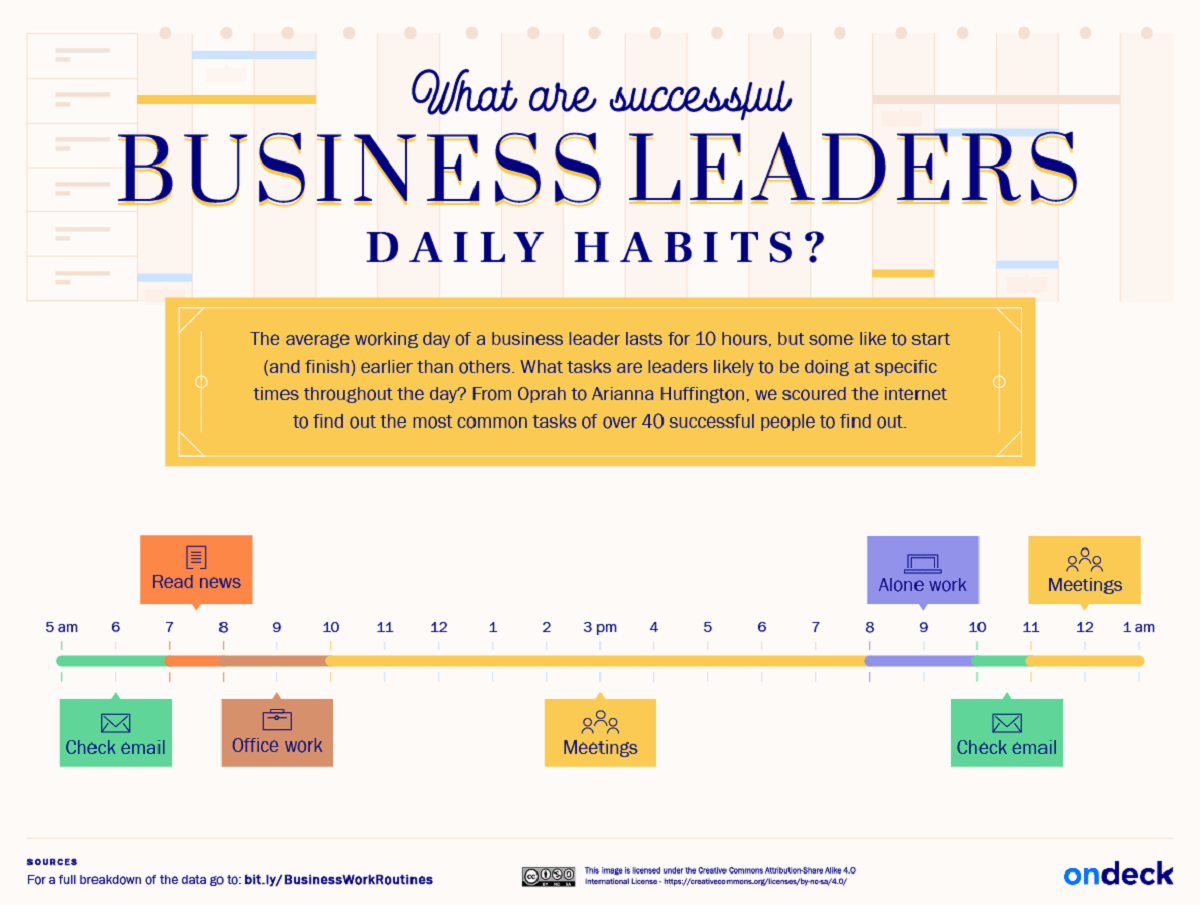“Depending on what they are, our habits will either make us or break us. We always become what we do.” – Sean Covey.
Q1 2021 hedge fund letters, conferences and more
Success is like a giant iceberg. What we see is pretty impressive, but most of it hides out of sight. And the parts we don't see aren’t particularly glamorous. Because behind every billionaire dollar success story, there's an unseen mountain of hard work, persistence, late-night, risks, and more than a few failures.
The journey to business success is rarely a sprint. Instead, it's an endurance race lasting for years, and sometimes even decades. But how do the best in the business stay motivated during the long struggle? How do they make sure they turn up every day and get the work done? Well, it's actually pretty simple. It comes down to the things they do day in and day out. In other words, it's about their habits.
The Working Habits Of Highly Successful Business Leaders
So to help you create a daily routine geared toward long-term success, OnDeck analyzed the working habits of 40 highly successful business leaders. Here's a look at what they found.
On average, these successful business leaders work around 10 hours a day. However, outliers like Elon Musk regularly clock an 80-hour work-week. And it's not unusual for Musk to break past the 100-hour barrier. Then again, Elon is revolutionizing the motor industry while also trying to send humans to Mars. The insane 80-100 workweek is the exception, not the rule.
It's essential to know the difference between working hard and pushing yourself beyond the limits, even during really tough times. Just ask Dr. Anthony Fauci, director of the U.S. National Institute of Allergy and Infectious Diseases.
After the outbreak of COVID-19, Dr. Fauci found himself working from 6.00 am to midnight for weeks on end. This kind of schedule is unsustainable over the long term. "I thought I could get away with almost no sleep,” said Dr. Fauci. "I did that for a few weeks, and it almost killed me. You’ve got to remember to eat, and you've got to remember to sleep.”
So no matter how busy you are, remember to give yourself time to regroup and recharge for the next challenge. After all, leaving the office a few hours earlier every Friday is far more productive than working flat out until you burn out.
Mark Cuban's Work Routine
Billionaire investor and Dallas Mavericks owner Mark Cuban works five hours a day. But it's an intense five hours. Cuban believes that how you work is far more important than how much you work. "Don't get caught up in how many hours you work," advises Cuban. "Judge success based on having goals and measuring your results. Hard work, and lots of it, is certainly needed, but focus on actually getting stuff done."
And Cuban isn't the only hugely successful business person who prefers the quality over quantity approach. Actress turned CEO Reese Witherspoon launched the clothing brand Draper James in 2015. Now that her business is up and running, Witherspoon works six hours a day, clocking off in the early afternoon. Tiny Capital co-founder Andrew Wilkinson works even less. What's more, he doesn't get into the office until around 12.30 pm. Still, he must be doing something right. Wilkinson is worth an estimated $500million.
Few people have been as influential as Apple founder Steve Jobs. The tech visionary dedicated the hours from 6.00 am to 9.00 am to 'alone work' in his study. This is when the famous ideas man would work through his latest concepts, brainstorm, and plan the company's next big move. Many other high achievers and creative types work this way, including Smart Minds CEO Thomas Dannhauser and biohacker Bob Troia. There's plenty of scientific research that suggests our brains are most active and creative in the few hours following sleep.
Getting Stress Out Of The Way
In fact, mornings are the best time to get the big and stressful stuff out of the way. Our natural circadian rhythms mean we're more awake and alert. We think faster, better, and are more resilient to stress. It also frees up the rest of the day, allowing us to work through the mundane tasks as we start to tire. Most of the business leaders OnDeck looked at use their mornings for meetings, important phone calls, or strategic planning sessions. They leave the admin work and inbox cleansing until the late afternoon and then often spend an hour in the evening planning out the next day.
Talk is cheap. Action is what really matters, and a large part of your success will come from making sure you turn up for work every day. Because while motivation will get you started, habit is what keeps you going! So remember these wise words from Greek philosopher Aristotle, "We are what we repeatedly do. Excellence, therefore, is not an act, but a habit."







